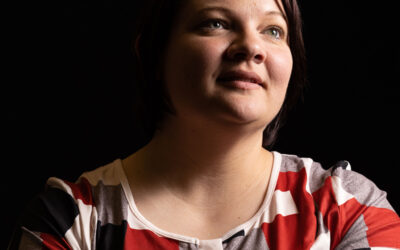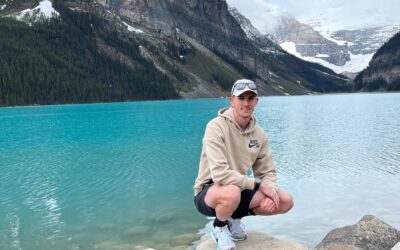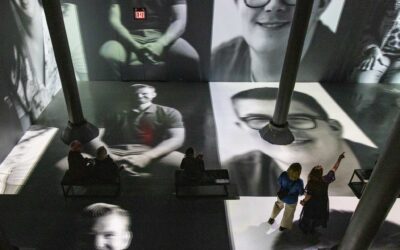blog
Life with Usher Syndrome: Finding Purpose Through Connection and Advocacy
by Laurie McBride
August 25, 2025
Living with Usher syndrome has been quite a journey for me marked by evolving challenges, resilience, and self-discovery. It was a journey that started long before I had a name for it. Some first notice subtle hearing loss but for me, I first noticed struggling to see at night or not always catching things in my peripheral vision. I just wrote these things off as something else. And I know I am not alone in this, because for many of us, me included, it takes years to get a correct diagnosis.
I remember those early signs of hearing or vision issues being so confusing. I went to doctors who suggested I just needed stronger glasses or hearing aids, never really looking for the deeper reason. I even got a couple of incorrect diagnoses before the pieces finally came together. Finding out that Usher syndrome was the root cause was a huge moment for me. It was a lot to take in, but also a relief to finally have an answer.
For me, getting the right diagnosis came after years of uncertainty. It wasn’t until I underwent genetic testing that I discovered I had Usher Syndrome Type 2C. Though there is no cure, having a name for what I was experiencing allowed me to plan and begin seeking the right support for the future.
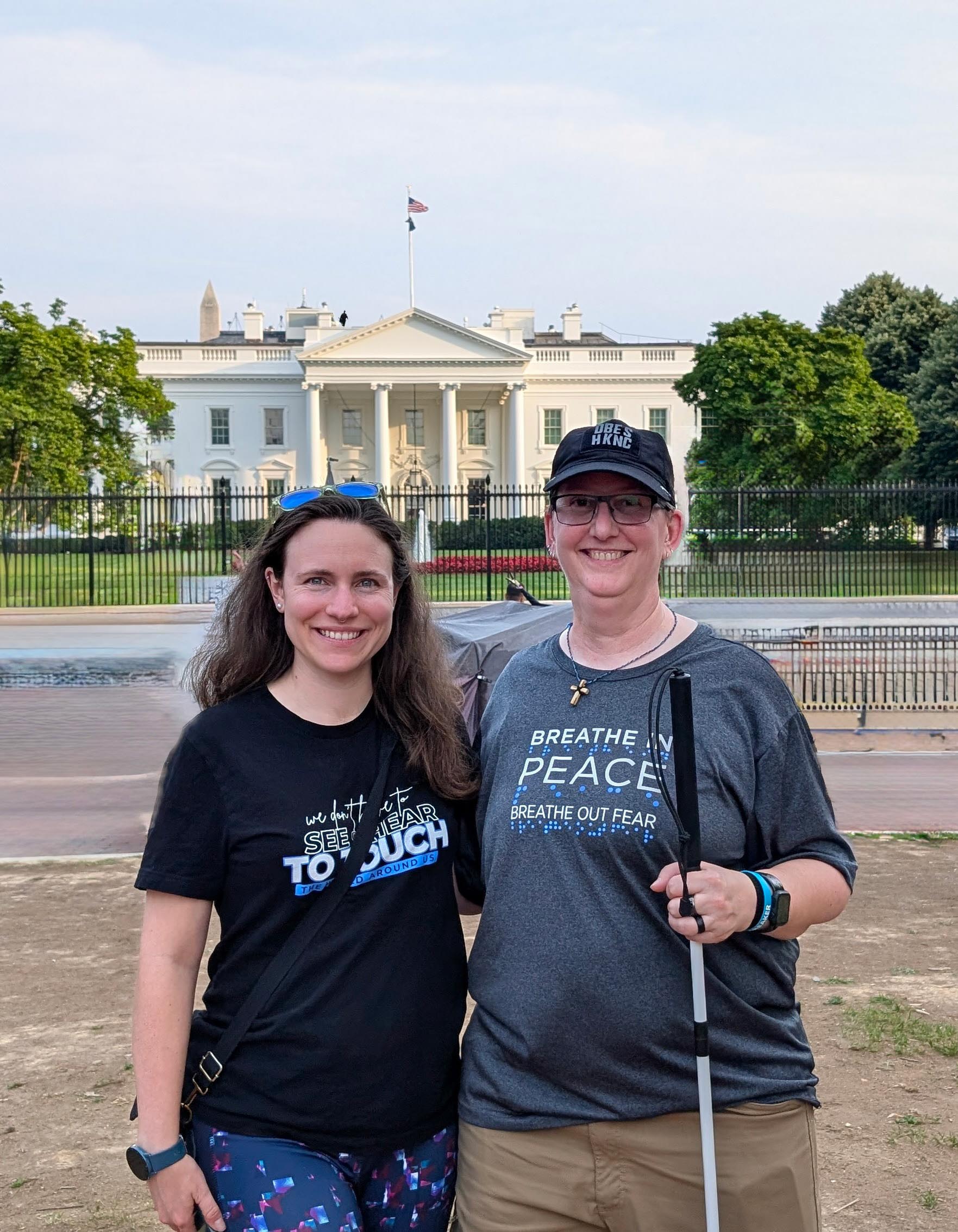
Two people stand smiling in front of the White House on a sunny day. On the left is a woman with long brown hair, wearing a black t-shirt that reads, “We don’t see barriers. TO TOUCH is to turn things around,” and colorful leggings. On the right is a woman wearing a dark baseball cap, glasses, and a dark gray t-shirt that says, “Breathe in PEACE, Breathe out fear.” She is holding a white cane in her left hand. The Washington Monument is visible in the background behind the White House, along with green trees and a blue sky. McKenna described the presence of sharpshooters stationed on the rooftop of the White House to Laurie. Then, by helping guide Laurie’s gaze to the precise location, Laurie was able to spot them herself, creating a shared and empowering experience.
Embracing Change
After spending nearly two decades in a demanding career, my declining vision forced me to rethink how I worked, traveled, and lived. Like many others with Usher syndrome, I eventually had to give up driving. It wasn’t a decision I took lightly; it impacted my independence, routine, and emotional well-being. But it was necessary for my safety and peace of mind.
As my vision changed, I also began to embrace new tools to support my independence. One of the most impactful being the white cane. At first, using it felt like admitting defeat. But in time, I came to understand that it wasn’t a symbol of limitation, it was a key to safety, confidence, and autonomy. Learning to use the cane helped me navigate unfamiliar environments and signal to others that I might need more space or support.
As my condition progressed, so did the complexity of daily tasks. That’s when I learned about the vital role of Support Service Providers (SSPs). SSPs helped me bridge the gap between the DeafBlind individual and the world around me by providing visual and environmental information, offering guiding support, and providing communication assistance. Whether navigating unfamiliar environments, reading visual cues, or helping at appointments, SSPs have made a huge difference in helping me stay active, informed, and engaged.
The Power of Community and Resources
My journey took a major turn when I connected with the iCanConnect program, part of the National Deaf-Blind Equipment Distribution Program (NDBEDP). They provided me with critical assistive technology that allowed me to maintain communication, work more efficiently, and stay connected to others.
This experience led me to return to school and eventually start working with other DeafBlind individuals across my state. I found a renewed sense of purpose through supporting others through the same challenges I had faced. For many of us, this kind of peer connection and mentorship is not only helpful but healing.
Movement, Mindset, and Motivation
Even with progressive vision and hearing loss, I’ve remained committed to staying physically and mentally active. One way I do that is through Taekwondo training. Martial arts provides structure, confidence, discipline, and physical awareness while reinforcing balance and body control. It has also helped strengthen my ability to adapt to change, trust my instincts, and remain resilient, both on and off the mat.
Like many activities, Taekwondo requires some modifications and support. Instructors have worked with me to make adaptations, and I’ve learned to rely on tactile cues and repetition to master techniques. The training is not just a physical outlet, it’s an empowering way to stay connected to my body, focus my energy, and maintain an active lifestyle.
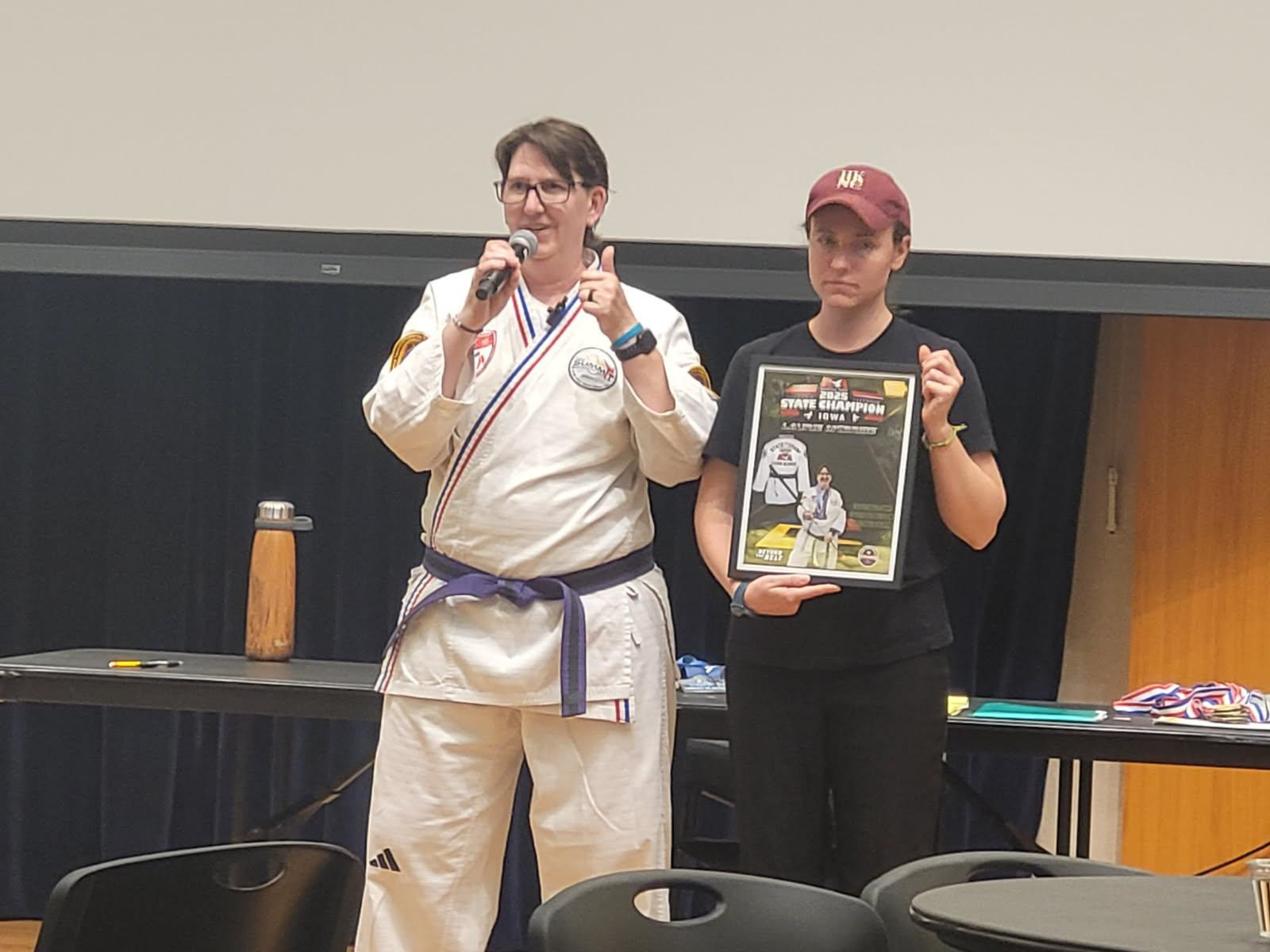
Laurie stands wearing her Taekwondo Gi (uniform) with a purple belt. She holds a microphone and is mid-speech, using expressive hand gestures and smiling proudly. On her left is McKenna, her Support Service Provider (SSP), who is connected to Laurie by gently touching their elbows. McKenna is holding a framed photo that declares Laurie as the 2025 Iowa State Champion in Forms, Weapons, and Sparring for her division.
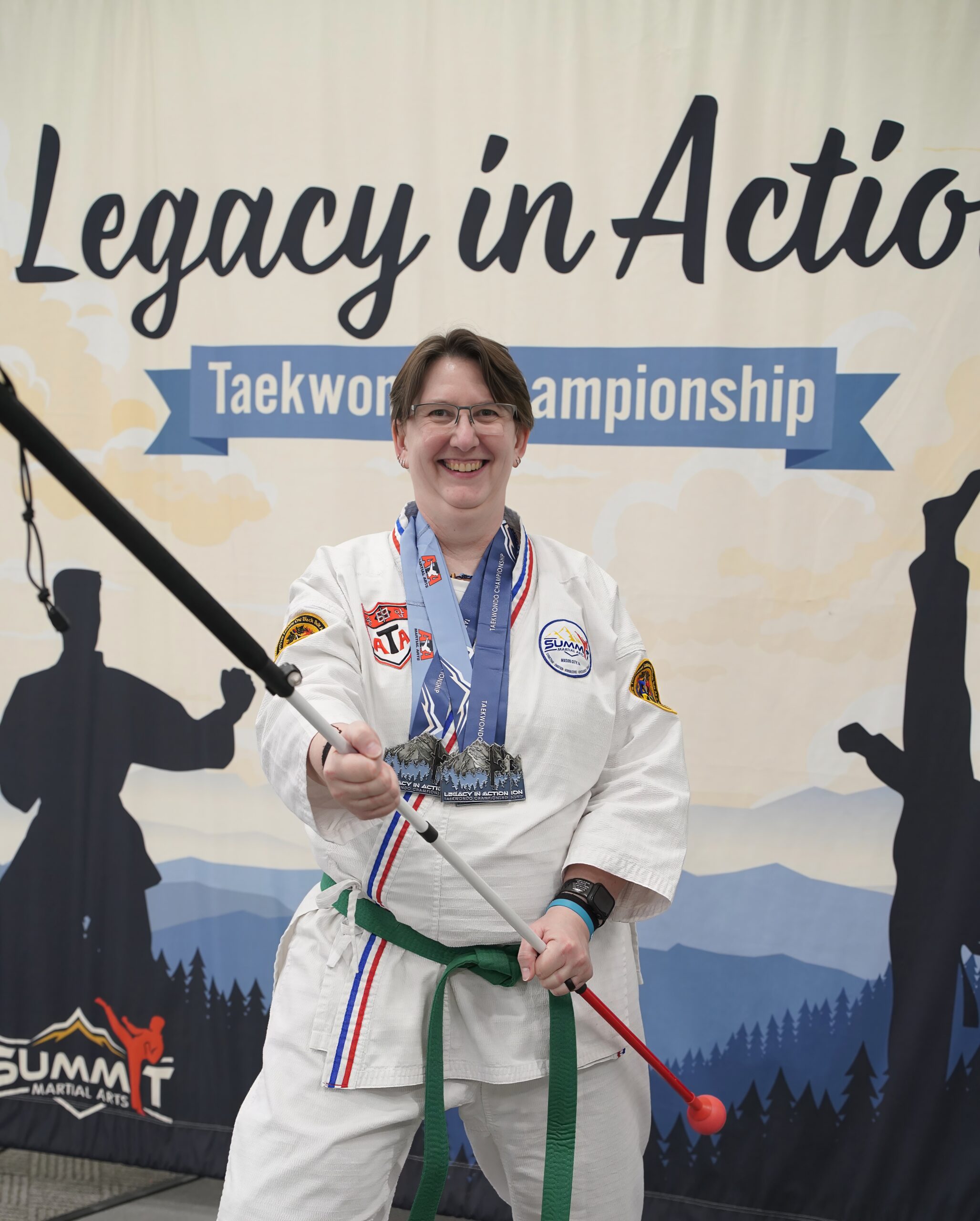
Laurie from the Legacy in Action Tournament wearing her first-place medals for forms, weapons, and sparring.
The Role of Advocacy and Education
Over time, I earned a Bachelor of Arts degree in Human Services and subsequently obtained a Master of Arts in Organizational Leadership, which deepened my understanding of systems change, inclusive leadership, and advocacy. These educational experiences have shaped my approach to fostering more equitable spaces for people with disabilities, both in the workplace and within the community.
I began working as a DeafBlind Employment Specialist, helping others with dual sensory loss find resources, training, and job opportunities. It’s a role that has reinforced my belief in the power of accessibility, advocacy, and inclusive design.
Living with Usher syndrome is not a linear journey. There are moments of grief, growth, and gratitude. There are days when the vision is good and days when it’s not. Some of us use white canes. Others rely on SSPs or technology. But through it all, we adapt and we keep moving forward.
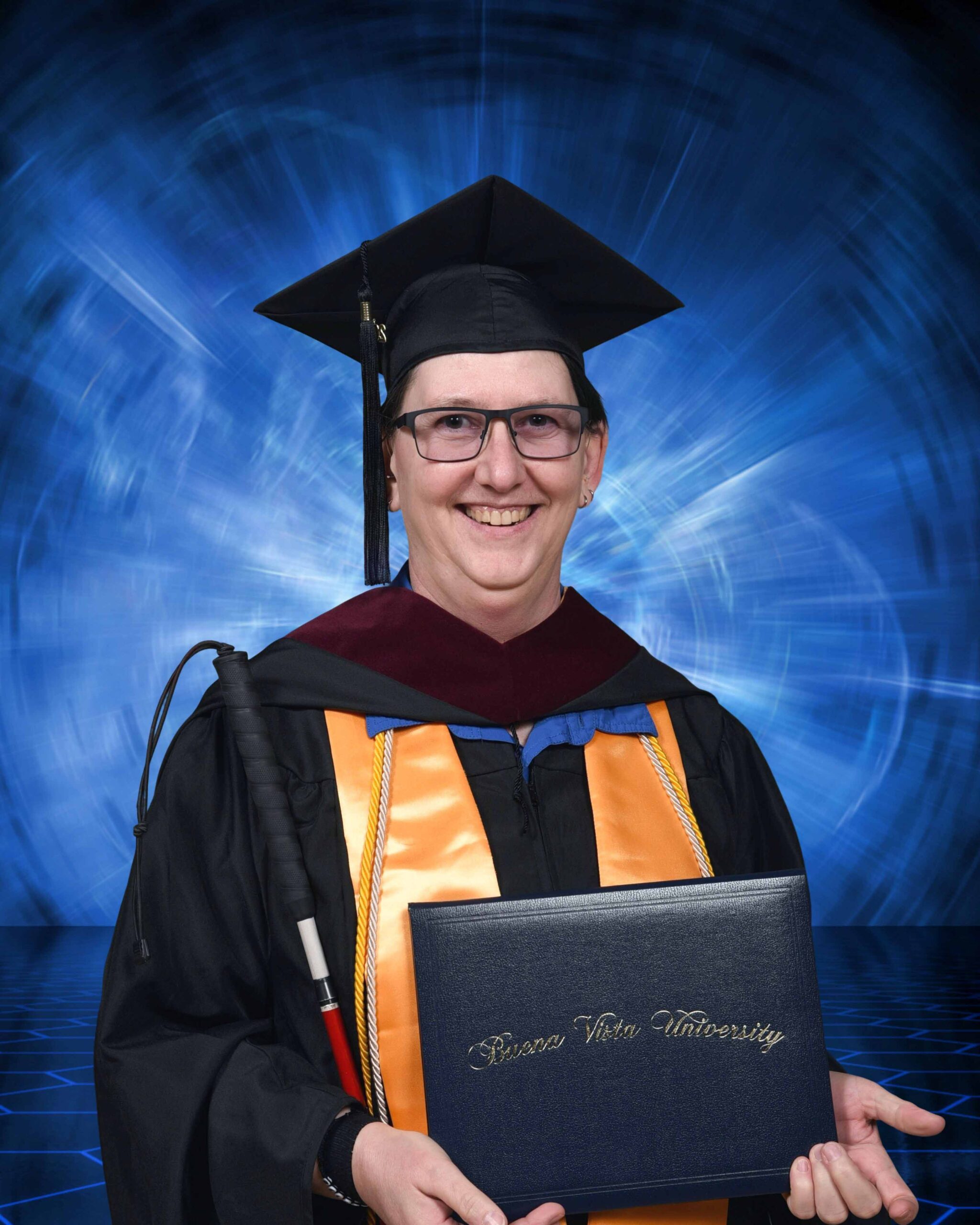
Laurie is pictured wearing a black graduation cap and gown, accented with a gold honors stole and gold cords. She is holding her university degree with both hands and her cane is resting against the right side of her body.
Shine a Light: A Community of Hope
One of the most meaningful connections I’ve made is through the Usher Syndrome Society’s Shine a Light on Usher Syndrome Campaign. This annual campaign brings together individuals, families, and advocates worldwide to raise awareness, share stories, and foster solidarity.
For those of us living with Usher syndrome, Shine a Light is more than a campaign, it’s a movement. It reminds us that we are not alone. We are part of a global community that understands our challenges, celebrates our strengths, and advocates for a brighter future. Sharing our stories helps others feel seen and supported. And hearing theirs reminds us that there’s strength in shared experience.
Looking Ahead
Living with Usher syndrome means navigating a world that’s not always built for me, but that doesn’t mean I can’t thrive. With the right tools, community, and support I have built a life full of purpose, dignity, and direction. And together, we can shine a light on awareness, on action, and on each other.
Explore more Blog posts
The Five Stages of Grief: A Journey with Usher Syndrome
blog The Five Stages of Grief: A Journey with Usher Syndrome by Sarah BaileyFebruary 9, 2026 I had always heard that loss follows a five-stage process: Denial, Anger, Bargaining, Depression, and finally, Acceptance. I never imagined that I would step onto the hamster...
Starting My Journey
blog Starting My Journey by Matt CameronDecember 15, 2025 I'm currently 28 years old. I was born and raised in Newcastle, New South Wales (Australia), but I currently live in Sydney. I was diagnosed with Usher syndrome Type 2, which means I have the typical...
See Us Hear Us: An Immersive Gallery Fundraiser
blog See Us Hear Us: An Immersive Gallery Fundraiserby Pamela AasenJanuary 12, 2026 On Thursday, October 23, I had the privilege of attending the incredible ‘See Us Hear Us’ fundraising event at Artechouse NYC, a premier venue in Chelsea known for hosting...
Help us find treatments and a cure.

